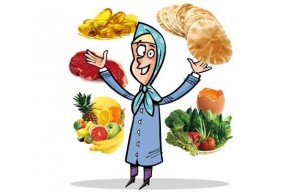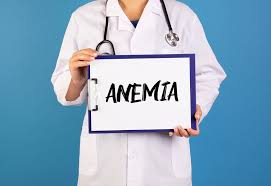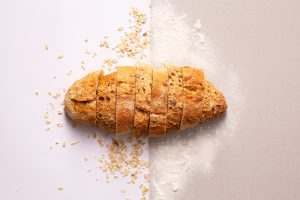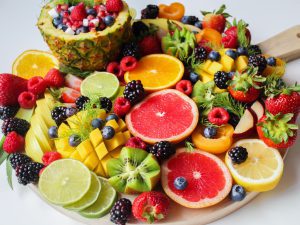You are hungry, but you do not know. You do not feel the need to eat, but each of your cells needs food, a food rich in micronutrients.
It is not unreasonable to call the deficiency of micronutrients,vitamins and minerals needed by the body, “hidden hunger”.

It may be widely believed that hunger mainly affects poor countries and strata, but many studies around the world show that latent hunger afflicts many people, even in developed and rich countries. .
Among different segments of the population, women are more vulnerable to deficiencies in certain vitamins and minerals due to specific physiological conditions. They lose iron through menstruation, which increases with menstrual irregularities, heavy bleeding, uterine fibroids, and even some malignant or benign uterine masses. As a result, iron deficiency is much more common in women than men.
In many cases, iron deficiency in women does not occur with anemia and is even associated with zinc deficiency and is accompanied by symptoms such as premature fatigue, hair loss and decreased brain function and power. The important thing in such a situation is that there is no reliable tool to diagnose zinc deficiency in a person, unlike iron, which results in incorrect rooting of the complications caused by zinc deficiency in the body.
Because the body’s cells need nutrients, such as carbohydrates, fats, proteins, and micronutrients, such as vitamins and minerals, for growth, vital functions, and tissue repair, it is important to assess the body’s position in terms of micronutrient intake. will find.
However, it is interesting to note that among the vitamins and minerals, women are most at risk for iron, zinc, vitamin A, vitamin D and calcium deficiencies.

Struggling with weakness and illness
Anemia may be the first impression of a woman with iron deficiency, pallor, and weakness, but the effects of iron deficiency on the body are much broader. Iron is also effective in increasing the mental and brain function of each person.
Also, the immune system is severely weakened by iron deficiency, and a person becomes ill quickly and frequently.
If the body does not get the iron it needs through nutrition, especially protein sources, and most importantly red meat, the immune system and blood formation will be impaired, and in chronic cases, even the bone marrow will be involved.
Nutritionists say that iron supplements are effective in compensating for iron deficiency: “Do not forget that iron is a toxic element and high intake of it can expose a person to numerous risks and diseases, including strokes.” Therefore, taking iron supplements should only be done under the supervision of a doctor and in the required amount.
To provide zinc, do not neglect the consumption of whole grain breads

Unfortunately, zinc deficiency is very common among people, especially children and women, which doctors say is one of the main reasons for the unavailability of one of its rich sources, whole grain breads in countries. Consumption of current fermented breads greatly inhibits the absorption of zinc, iron and calcium in the body.
When bread dough is kneaded, an enzyme is activated in the grain that not only improves the quality of nutrition but also helps absorb the zinc and iron in the grain, but because baking soda has replaced the bread fermentation process today, one The main source of zinc suppliers is lost in the family nutrition basket. Of course, it is still the most important source of iron and zinc in the body of various meats, especially red meat. Interestingly, the most important signs of zinc deficiency in children are lack of height growth and impaired sexual maturity, especially in boys. Also, impaired hair growth and recurrent infections can be signs of zinc deficiency in adults, especially women.
From depression to decreased muscle strength with vitamin D deficiency
We all know that the sun’s ultraviolet rays, with all their harms in terms of causing skin cancer in people, are the most important source of vitamin D in the skin and in fact in the body, but we should not forget that the angle of sunlight in making and absorbing vitamin D in the body It plays a big role and the winter sun is not enough to make this vitamin, even in sunny cities.
However, you should know that not only does the use of sunscreen along with clothing prevent the absorption of sunlight into the skin, but also in countries, vitamin D deficiency is more common in women because they are less exposed to sunlight than men. . That is, studies show a deficiency of this vitamin in women above 40% and even up to 90%. Because vitamin D is essential for calcium absorption, a deficiency in this vitamin is associated with impaired calcium absorption, and even with dairy consumption, calcium deficiency is seen in people.

Vitamin D deficiency is associated with symptoms such as depression, mental disorders, and decreased muscle and bone strength. There have also been findings linking vitamin D deficiency to the risk of cardiovascular disease, infection, autoimmune diseases, rheumatoid arthritis, multiple sclerosis, type 1 diabetes and some malignancies. One of the best sources of vitamin D is high-fat fish or fish oil, followed by egg yolks. Of course, the percentage of this vitamin in egg yolk is very small and it is better to use vitamin D supplements under the supervision of a specialist.
Vitamin A deficiency occurs with skin complications
Apart from the effect of vitamin A deficiency on the visual system, especially in children and in developing countries, there are other symptoms in addition to visual disorders due to the lack of this vitamin, especially in women, which include weakness in the body’s defense system and skin symptoms. .
These symptoms usually occur in the form of horns and dry and brittle skin and hair, and also lead to increased hair loss.
The most important food sources rich in this vitamin are meat, eggs, dairy products and vegetables and fruits, especially carrots, apricots, plums, peaches, and cantaloupes.
Medical site and health magazine im healthiest
